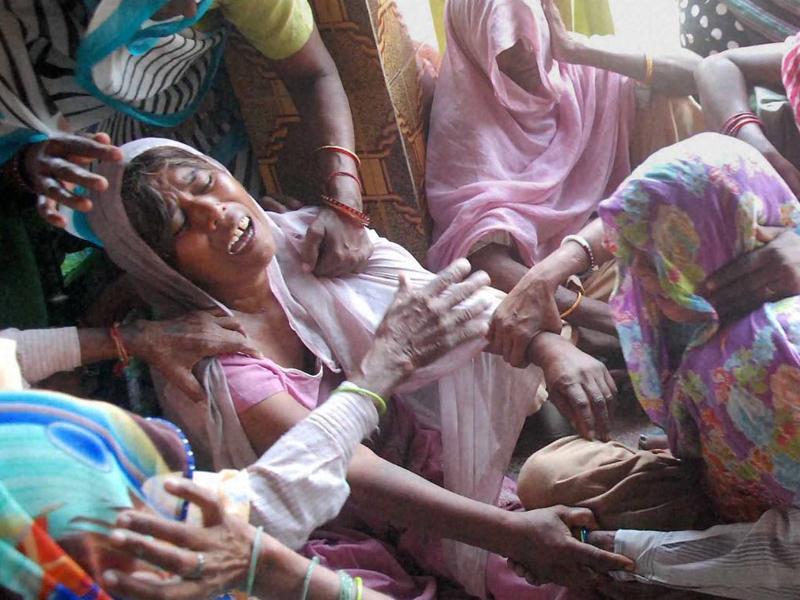A study by the Chennai-based Citizens’ Vigilance and Monitoring Committee (CVMC) has found that over the period 2015-22, a sum of ₹1140 crores in immediate monetary relief was denied to those verified as victims of atrocities under the Scheduled Castes and Scheduled Tribes (Prevention of Atrocities) Act 1989. According to the National Crime Records Bureau’s annual reports there are 44377 recorded cases of murder, rape and arson under the Act over this period.
The monetary relief pertains to the Dr Ambedkar National Relief for the Scheduled Castes and the Scheduled Tribes Victims of Atrocities Scheme (DANVAS) instituted early in the first term of the Narendra Modi-led National Democratic Alliance government at the Centre. DANVAS was put in place after a review of the existing monetary relief being provided under the SC-ST Act 1989 with equal contributions from the government and the Centre found that the relief wasn’t reaching the victims because the states claimed they did not have adequate funds to contribute their share. Under the new scheme, the Dr Ambedkar Foundation, an autonomous society under the Union Ministry of Social Justice and Empowerment, was empowered to release the funds instantly to the victims of murder (₹500,000 for the murder of earning members, ₹200,000 for the murder of others), rape (₹200,000), arson (₹300,000), and permanent disability (₹300,000 for earning members, ₹150,000 for others) that have been registered under the SC-ST Act on receipt of an application and supporting documents – the FIR and the autopsy report/medical certificate – from the district magistrate under whose jurisdiction the crime was committed.

Yet, after studying the Dr Ambedkar Foundation annual reports, the reply in Parliament and NCRB annual reports, Deepthi Sukumar and Geetha Vani of CVMC discovered that less than 2 per cent of the eligible victims had been provided relief from 2015 to 2020. Since the data on the number of beneficiaries in 2021 and 2022 was unavailable, they assumed 50 beneficiaries each in both years (which was close to an average number of beneficiaries in the previous years). The figure they arrived at was “44,000 victims denied Rs 1,140 crores as a conservative estimate”. This is a conservative estimate because the NCRB annual reports do not have data on instances of permanent disability inflicted.
Dr Ambedkar Foundation – Instant monetary relief (Murder, Rape, Arson)
| Year | Victims | Disbursed | % denied | Amount due (₹) | Amount disbursed (₹) | Amount denied (₹) | % denied |
|---|---|---|---|---|---|---|---|
| 2015 | 4,385 | 84 | 98.10% | 116,20,00,000 | 25,250,000 | 1,136,750,000 | 97.83% |
| 2016 | 4,653 | 60 | 98.72% | 123,27,00,000 | 18,400,000 | 1,214,300,000 | 98.51% |
| 2017 | 4,887 | 24 | 99.50% | 125,81,00,000 | 7,780,000 | 1,250,320,000 | 99.38% |
| 2018 | 5,128 | 57 | 98.89% | 134,10,00,000 | 17,883,750 | 1,323,116,250 | 98.67% |
| 2019 | 6,004 | 26 | 99.56% | 156,63,00,000 | 8,606,250 | 1,557,693,750 | 99.45% |
| 2020 | 5,734 | 6 | 99.90% | 148,20,00,000 | 2,250,000 | 1,479,750,000 | 99.87% |
| 2021 | 6,598 | 169,67,00,000 | |||||
| 2022 | 6,988 | 177,42,00,000 | |||||
| Total | 44,377 | 1,151,30,00,000 |
Source: The Dr Ambedkar Foundation annual reports, Reply in parliament (unstarred question 1252 in the Rajya Sabha, 8 December 2021), Crime In India (National Crime Records Bureau)
But the final nail in the coffin was that on 13 January 2023 Dr Ambedkar Foundation published a notification (DAF/1/2023-ADMIN-DAF 1/25058/2023 EO-64933) on its website announcing that DANVAS (along with the inter-caste marriage scheme) would be merged with the centrally sponsored scheme for the implementation of the Protection of Civil Rights Act 1955 and Scheduled Castes and Scheduled Tribes (Prevention of Atrocities) Act 1989 run by the Ministry of Social Justice & Empowerment with effect from 1 April 2023. The victims were given time till 28 February 2023 to apply for relief and the Foundation gave itself time till 31 March 2023 to process any pending applications. Deepthi Sukumar and Geetha Vani write, “On 26 February 2024 circular 11011/14/2023-PCR (DESK) from the MoSJ&E sent to all state nodal officers and the union ministries of home, tribal affairs, and law and justice detailed the formats to apply for the centrally sponsored schemes. Curiously, the formats do not have anything on DANVAS.”
But why DANVAS was so underutilized and thousands of SCs and STs who were victims of atrocities denied monetary relief as part of the scheme is still a mystery. The onus on applying for relief fell on the district magistrate concerned and not on the victim and as Deepthi Sukumar and Geetha Vani note, the meticulous procedure followed in registering a case under the SC-ST Act ensures that the documentation required to prove eligibility for DANVAS is readily available to the district magistrate. “Any atrocity information received is recorded under Rule 5, and an officer of rank deputy superintendent of police or subdivisional magistrate or higher conducts an inquiry immediately under Rule 6. On confirmation, both the superintendent of police and the district magistrate conduct a spot inspection under Rule 12(1). The superintendent of police ensures that the FIR is registered with the right sections.” But an annual DANVAS budget that wouldn’t cover even a tiny fraction of the victims exposes the lack of intent on the part of the government from the get-go. The scheme was designed to fail.
(Read the Hindi translation of this article here.)
Forward Press also publishes books on Bahujan issues. Forward Press Books sheds light on the widespread problems as well as the finer aspects of Bahujan (Dalit, OBC, Adivasi, Nomadic, Pasmanda) society, culture, literature and politics. Contact us for a list of FP Books’ titles and to order. Mobile: +917827427311, Email: info@forwardmagazine.in)





